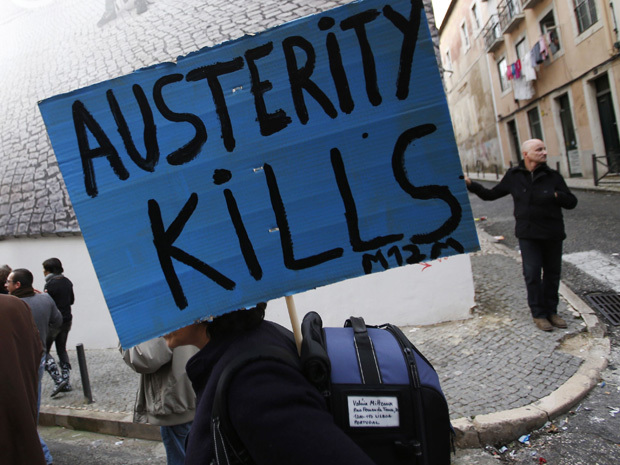What some call balancing the budget, others call damaging austerity policies. German Chancellor Angela Merkel is particularly frustrated with the term ‘Austerity’, saying it makes the policies “sound like something truly evil”. Like Merkel, other Western leaders such as the British Prime Minister David Cameron and the Canadian Finance Minister Jim Flaherty also endorse slashing fiscal expenses and cutting debt in order to keep the debt-to-GDP ratio down. However, these policies come at a price, and some would argue that it is too high. Portugal, Italy, Spain and other countries in the Eurozone periphery are amongst the most vocal advocates of loosening austerity. Why?
Economic Miscalculations
The fiscal multiplier, in simple terms, measures the effect of a change in government spending on national income. If the multiplier is 0.5, then a 1% decrease in fiscal spending will result in a 0.5% decrease in national income.
The austerity programs imposed by the Troika (The International Monetary Fund (IMF), the European Central Bank (ECB), and the European Commission) were determined based on IMF forecasts and estimates of economic variables. In particular, they calculated the fiscal multiplier to be an average of 0.5. In this scenario, fiscal consolidation would cause a relatively low ripple in the economy, but the assumption was a severe misjudgment.
Chief IMF Economist Olivier Blanchard, along with IMF researcher Daniel Leigh published a Working Paper titled Growth Forecast Errors and Fiscal Multipliers, in which they argued that “for every additional percentage point of GDP of fiscal consolidation, GDP was about 1 percent lower than forecast”. This finding means that the budget cuts caused an average drop in the GDP of the bailed out economies that was more than double of what the IMF predicted. As a result, when countries like Portugal, Greece, Ireland, Italy and Romania drastically cut government spending in their efforts to accommodate their international lenders, they only experienced even greater growth setbacks.
The Greek economy, for instance, has shrunk an estimated 16% while unemployment is at 25%, almost double of what was predicted: 7% economy contraction with a maximum of 14% unemployment. Portugal is on a similar, if less dire, boat and has experienced a 3.2% contraction (with a further 2.3% expected this year), a 40% decrease in investment and 16.9% unemployment in 2012.
Austerity has effectively stifled growth throughout the Eurozone. According to the authors, even in stronger economies like Germany and Britain, recovery from the economic crisis has been slower than anticipated. Additionally, they consider countries like Australia and Canada to also be at high risk which mostly “reflects elevated real exchange rates, owing, in part, to their position as commodity exporters.”
[captionpix align=”left” theme=”elegant” width=”300″ imgsrc=”http://natoassociation.ca/wp-content/uploads/2013/05/gty-154440996-4_3_r560.jpg” captiontext=”Mass protests have taken place in most Eurozone countries, denouncing the damaging austerity policies. “]
Social Implications
The pressure on governments to slash the debt-to-GDP ratio has created serious domestic discontent. In order to curb spending, the leaders of Spain, France, Portugal, among others, need to severely cut public programs and welfare projects, which makes them unable to address mounting unemployment and poverty. Several anti-austerity protests have already taken place, but the governments remain tied to their bailout agreements.
The outlook is even more dismal for younger generations. In March, European Parliament President Martin Schulz warned of the danger of a ‘lost generation’ even if “we have saved the banks”. Recently, Greece said its youth unemployment had exceeded 60%, Spain’s is above 50% and Portugal has just topped 40%. These rates create the risk of a very long term recession. If the young population cannot work and therefore cannot develop skills for the future, the path to continuous growth becomes rockier than ever.
This concern is deepened by the rising child poverty rate. According to Caritas, a global charity, 30% of children in Greece, Ireland, Portugal, Italy and Spain live in, or on the brink of, poverty. This spells out not one, but several lost generations if governments are not allowed to loosen austerity measures in order to alleviate the social crisis.
Political Frictions
The enforcement of austerity has created tensions, not only domestically, but also within the European Union. With Germany leading the austerity campaign, and standing firm on its ‘budget-consolidating’ policies, and France’s growing unemployment and civil discontent, the relationship between the two Eurozone powers has become increasingly difficult. Their cooperation is crucial to the effectiveness of the economic bloc, especially given the open dissatisfaction with the EU, and the fact that Britain is considering withdrawal. However, mutual and widely publicized criticism over austerity – Germany is selfish while France lacks commitment- has led to a widening of the Franco-German rift.
Austerity also raised objections from external allies: Europe’s G20 partners have urged the EU to shift away from austerity programs. The European Commission President Jose Manuel Barroso agreed and declared that austerity had “reached its limits”, but Germany, showing no signs of yielding, maintains that “declaring an end to consolidation is absolute nonsense”. This attitude has sparked widespread criticism of the Merkel administration, and a growing divide with other EU members.
NATO Secretary General Anders Rasmussen, while acknowledging the strain that the economic crisis has created for governments in Europe, also calls for a stronger commitment to defense and security spending. In his May 6th address to the European Parliament he maintains that if governments neglect defense investment, the idea of “a strong and open Europe is just talk”.
Austerity So Far
The Eurozone reported its sixth consecutive quarter of negative growth, making it a longer recession than the one that followed the 2008 crisis, even if not as deep. In short, austerity has showed no signs of working: unemployment rates are soaring across the region as well as public unrest while growth is stalled. Instead, with the recession, it became a double punch that the Eurozone economies have not been able to absorb.




